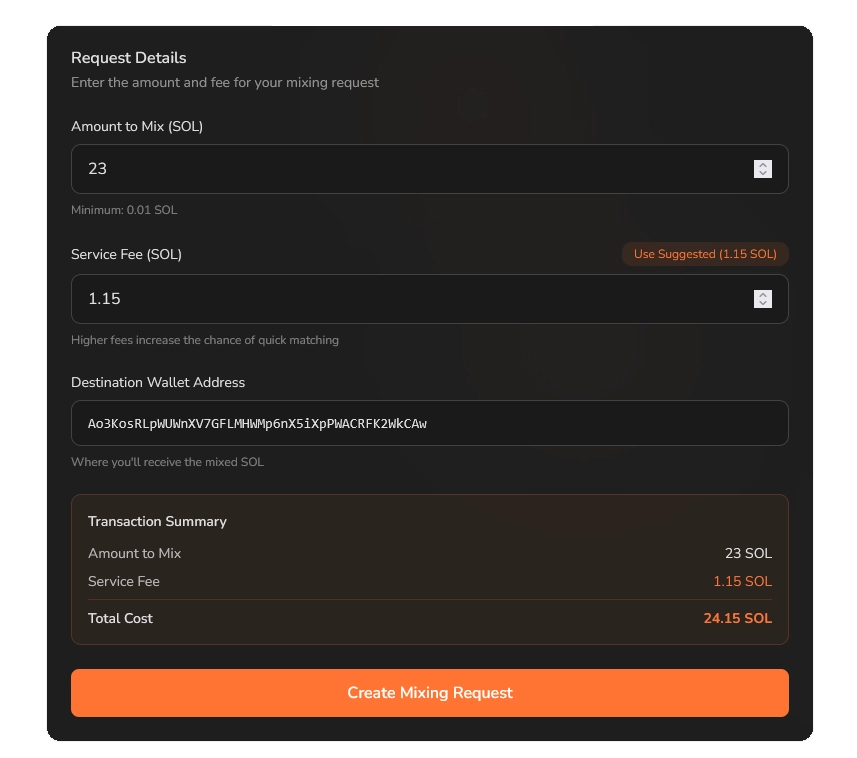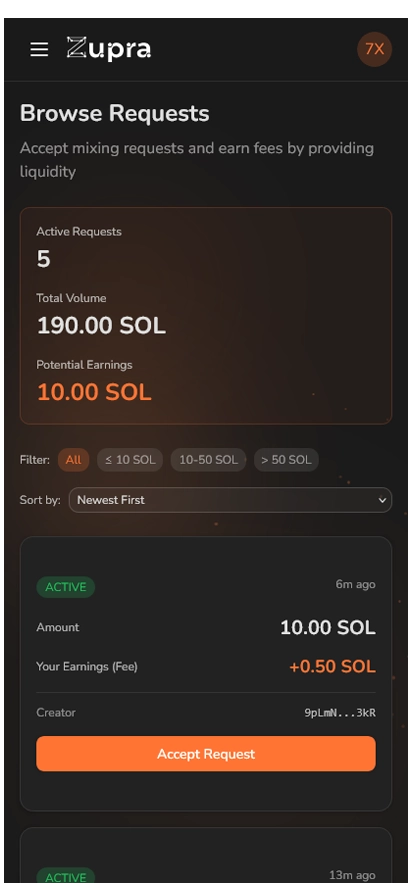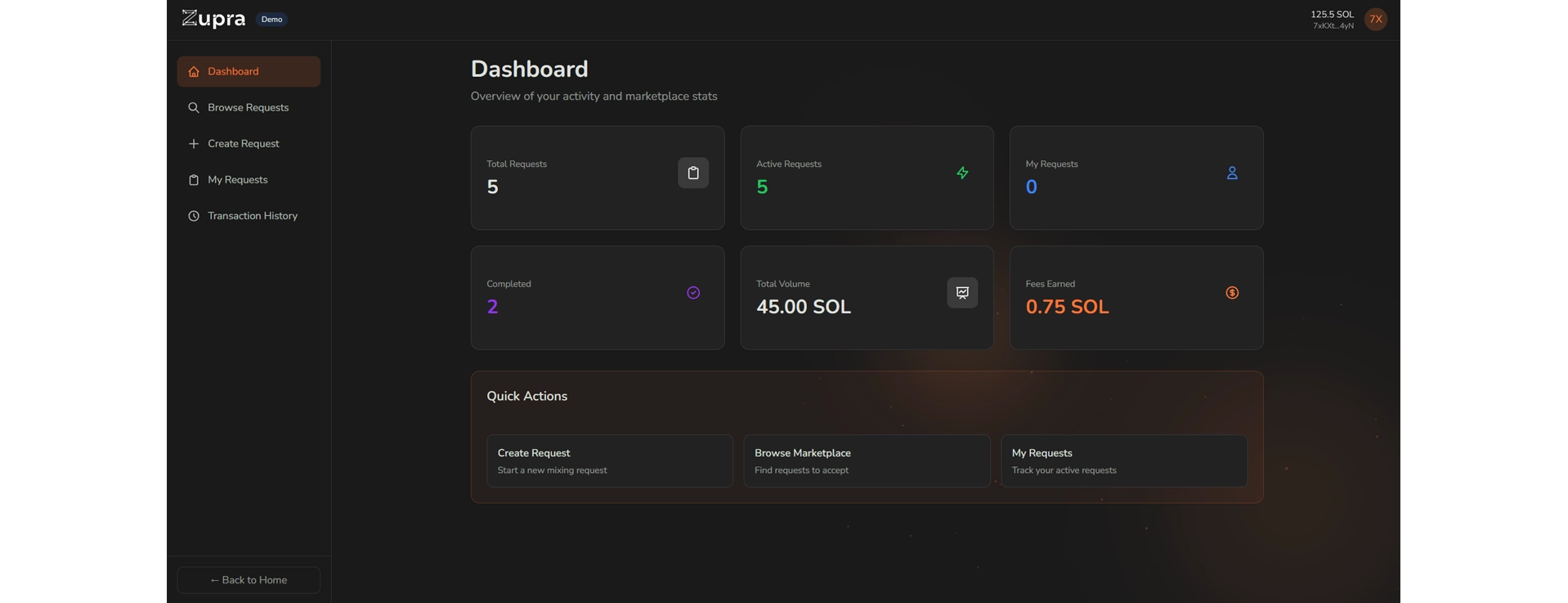The Journey to Privacy
Understanding the challenge, recognizing the need, and discovering the solution
Every Transaction Tells Your Story
The transparency paradox
Every transaction on Solana is permanently recorded. Visible. Traceable. Your wallet address tells a story anyone can read.
The cost: Your competitors see every deal. Your financial patterns exposed on a public ledger.



Why Privacy Matters
Legitimate needs for legitimate reasons
Business Confidentiality
A business doesn't want competitors seeing supplier relationships, customer transactions, or strategic moves. Commercial privacy isn't suspicious, it's professional.
Personal Security
An individual doesn't want their entire financial history public. Privacy protects against targeted attacks, social engineering, and unwanted attention.
Financial Freedom
Privacy is a fundamental right. The ability to transact without surveillance is essential to financial freedom and personal autonomy.
Traditional solutions require trust in centralized services. Regulatory compliance becomes complex. Technical barriers exclude many users. There must be a better way.

Decentralized Mixing Marketplace
Privacy without trust
What if users could request mixing services? What if other users could fulfill those requests? What if smart contracts handled everything trustlessly?
A decentralized marketplace means no central authority. No single point of failure. No trust required. Users collaborate to achieve privacy, with smart contracts ensuring fairness.
The economics are simple: users pay fees for mixing services. Other users earn fees by providing liquidity. Everyone benefits. Supply meets demand. The market balances itself.
This is how we give users choice. Transparent when needed. Private when wanted. Trustless by design. Accessible to everyone.

Trustless by Design
Smart contracts eliminate the need for trust
How The Marketplace Works
From request to completion: the step-by-step process of trustless mixing
You decide how much SOL you want to mix. There's no minimum or maximum mix what you need. The amount is entirely your choice.
Next, you set the fee you're willing to pay for the mixing service. Higher fees attract liquidity providers faster, but you control the price. Market dynamics determine what's competitive.
Finally, provide the destination wallet address where you want to receive your mixed SOL. This is the wallet that will receive the funds, breaking the direct link to your source wallet.
What happens next:
Your request is published to the decentralized marketplace, visible to all liquidity providers looking to earn fees.
Liquidity providers browse the marketplace, looking for requests they want to fulfill. They're attracted by the fees you're offering economic incentives in action.
When a provider accepts your request, the smart contract automatically creates a unique middleware wallet using Program-Derived Addresses (PDAs). This wallet is created specifically for your transaction.
The middleware wallet is controlled entirely by code. No human can access it. It exists solely to route funds between participants.
No trust required:
The matching happens automatically. The wallet is created programmatically. Everything is handled by trustless smart contracts on Solana.
Both parties' funds are held securely in escrow by the smart contract. Your SOL plus the fee. The liquidity provider's SOL. All held by code, not people.
The escrow logic uses Solana's PDA-based security model. The funds are locked in a program-derived address that only the smart contract can control.
No one can access the funds until all conditions are met. Not you. Not the liquidity provider. Not even the developers. The code is law, and that law protects everyone.
Security guarantee:
Funds are only released when the smart contract verifies that all parties have fulfilled their obligations. Either everything succeeds or everything reverts.
The smart contract executes the exchange atomically. Your SOL travels: Source Wallet → Middleware Wallet → Liquidity Provider. The liquidity provider's SOL takes a different path: Their Wallet → Middleware Wallet → Your Destination.
The middleware wallet acts as the routing point. It receives funds from both parties and distributes them according to the agreed terms.
The entire transaction is atomic either everything succeeds or everything reverts. There's no possibility of partial completion or fund loss.
Both parties benefit:
You receive mixed SOL at your destination wallet. The liquidity provider receives your original SOL plus the fee you offered.
The link between your source wallet and destination wallet is now broken. On-chain analysis shows transfers through the middleware wallet, but cannot directly connect your source to your destination.
All transactions are visible on-chain and fully compliant with blockchain transparency requirements. But the direct association between your wallets is decorrelated.
As more users participate in the marketplace, the privacy layers multiply. Each mixing operation adds another degree of separation, making it increasingly difficult to trace financial activities.
Network effects amplify privacy:
More users means more mixing paths. More mixing means stronger privacy. The network effect works in your favor.

Privacy Preserved
On-chain transparency meets off-chain privacy
The Power of Decentralization
Why marketplace-driven privacy changes everything
Smart contracts handle everything. You never have to trust another person or company with your funds.
Freedom from intermediaries means freedom from risk. The code executes exactly as written. No hidden terms. No special permissions. No trusted third parties. Smart contracts are your guarantors.
You set the fee. Liquidity providers compete to offer you service. Supply and demand determine fair prices.
Fair pricing through competition. Users control costs. Liquidity providers earn rewards for service. The invisible hand of the market ensures efficiency. No fixed fees. No hidden charges. Just pure economics.
More users means more mixing paths, stronger privacy, and faster matches. The network effect works in your favor.
Strength in numbers. Every new user multiplies the possible paths. Every transaction adds a layer of privacy. The system becomes stronger as it grows. Your privacy benefits from others.

Real-World Value
Privacy for everyone, everywhere
Real-World Applications
Privacy isn't suspicious. It's responsible. It's professional. It's a fundamental right.
Protecting Commercial Transactions
Businesses need confidentiality. Competitors shouldn't see your supplier relationships, customer transactions, or strategic financial moves. Commercial privacy isn't about hiding it's about maintaining competitive advantage.
Use Cases:
- Supplier payments
- Customer transactions
- Strategic acquisitions
- Competitive research
Individual Financial Privacy
Individuals deserve privacy too. Your entire financial history shouldn't be public knowledge. Privacy protects against targeted attacks, social engineering, unwanted attention, and financial profiling.
Use Cases:
- Personal savings
- Investment activities
- Large purchases
- Wealth management
Institutional Privacy Needs
Organizations from DAOs to non-profits need financial privacy. Budgets, grants, donations, and operational expenses are often sensitive information that shouldn't be publicly traceable.
Use Cases:
- DAO treasuries
- Grant distributions
- Operational budgets
- Member compensation
Experience Trustless Privacy
The transparency paradox has a solution. Decentralized. Trustless. Accessible. Legal.
Try our interactive demo to see the full mixing flow in action, or dive deep into the technical architecture in our comprehensive whitepaper.
This is how we enable financial privacy on blockchain. This is how we give users choice.